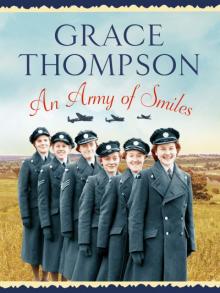- Home
- Grace Thompson
The Runaway Page 8
The Runaway Read online
Page 8
Changing the heavy suitcase from one hand to the other she opened the gate and only then looked at the house. There were lights on in every room even though the day wasn’t particularly dark. Samuel and his mother were already home, she thought with a sigh. She heard the murmur of voices as she opened the door. Hoping it wasn’t the doctor, she called:
‘I’m back. Mrs Thomas? Did you have a good time?’
The doctor came out of the kitchen, followed by Samuel. ‘I’m so sorry, Faith,’ the doctor said. ‘Mrs Thomas died just an hour ago.’
chapter four
The shock of the unexpected death of Mrs Thomas kept Faith awake all night. Several times she went down and stared at the night sky and once she made a hot drink, hoping that it would relax her, but thoughts of the time she had spent looking after the lady, memories of the happy times they’d had, made her sad. It was more than losing a job. She had lost a friend and the loss was leaving her with an emptiness far greater than she had felt before. She had moved away and left people behind, but this time it was she who had been left and it was hard to take.
She thought back over the past months and wondered whether she could have done more. Would Mrs Thomas still be alive if she hadn’t sent her off to stay with Samuel? Was there some neglect in the way she had persuaded her to sit outside as the weather became cooler? Could she have provided better food?
Sleep came eventually and the alarm she had set for 6.30 startled her into wakefulness. She lay and grieved anew as the memory flooded back. She didn’t expect to see Samuel up so early but he was sitting in an armchair, disapproval in his eyes. ‘You slept well?’ he asked sarcastically. She didn’t reply.
Faith had never dealt with funeral arrangements before but she was determined to do her best for Mrs Thomas. While Samuel was on the phone telling people the news, she began making lists of what she needed to do. Once the date and time had been decided she would plan the food. Mrs Thomas, who, she was surprised to learn, had been seventy-nine, had few friends able to attend. She hoped Samuel would bring people with him, a very small group saying farewell to the lady would make a sad occasion worse.
‘Would you like me to write to anyone on your behalf?’ she asked when Samuel came to find her.
‘What has it to do with you? You’ll be leaving now your work here is done.’
‘But don’t you need my help with the arrangements?’
‘You were her companion and as she’s no longer here your work is finished, surely you can understand that?’
‘You want me to go now?’
‘You have no job, so of course I want you to go. Now, if you’ll excuse me,’ he said with his usual unpleasant tone, ‘I need to get on to the funeral directors.’
He sounded so cold she felt sickened. She was still shocked by the sudden loss of her employer and Samuel was talking as though he were booking a meal or a visit to the theatre rather than her funeral. ‘I can stay until I find somewhere to live, surely?’
‘I’d prefer it if you found alternative accommodation immediately, but perhaps, as long as you don’t try to interfere, you can use the room until the weekend. You can pack up her clothes, that will keep you busy,’ he added.
The ‘Thank you,’ stuck in her throat and she walked away after handing him the lists she had prepared.
People came and went throughout the day and she sat in her room, convinced that at some point Samuel would realize he needed help and would call her. But the people, whom she didn’t meet, or even see, were presumably given the various tasks to do. To take her mind off thoughts of where she would go and what she would do, she wrote out a shopping list and planned the spread, guessing that there would be no more than a dozen people. On Wednesday she showed him the list and suggested she might go and buy what he would need.
He handed her some money, counting it carefully into her hand as though she were an untrustworthy child. ‘Don’t forget the receipts,’ he said, ‘and before you leave I would like to see your accounts.’
‘They are all in Mrs Thomas’s bureau,’ she replied sharply.
On Wednesday, aware that time was running out, she walked around the shops looking for anything that would offer employment and somewhere to live. A few shops had notices in the window asking for assistants. The choice was surprisingly varied but none strongly appealed. There were the fishmongers, where she had been a regular customer, an ironmongery, a corner shop selling the usual assortment of foodstuff and a place selling children’s toys. What she really wanted to do was return to teaching but she was afraid that would make it too easy for Matt to find her. Later, perhaps, but how much later? Matt wasn’t the kind to give up.
She knew she had to face him sometime but the further away that day was, the better she’d be able to cope with his questions, his hurt and the anger, aware that she had so little time made her face up to making a decision, and she made her first enquiry at the corner shop. To her dismay she was told quite rudely that they needed an assistant with experience. At the toy shop she learned that the place had been filled but, interested in her, they took her name in case the new person didn’t suit. At the ironmongers she was laughingly told they needed a man who knew something about tools and how they were used. She felt like a beggar, asking for something to which she wasn’t entitled, a scrounger, expecting more than she should.
There was only the fresh-fish shop and she turned away from that. No. Handling the cold, wet fish was not something she could contemplate. Perhaps the best thing was to first find a room. She didn’t want to end up sleeping on a park bench! Having a base and enough money to last a few weeks would give her a chance to look around, go to the employment exchange and hopefully find something she would enjoy.
The columns in the local newspaper offered several rooms to let. When she knocked on the door of the first, in a neat road behind the hospital, it was answered by a woman about her own age. She was shown the room, which was at the back overlooking a rather unkempt garden. She took it and paid a week’s rent in advance. The landlady, Jean Painter, explained that she needed some extra money as her husband Roland was still a student, studying psychology.
After a friendly chat Faith stood to leave, smilingly convinced that she had found herself a safe haven. ‘Now all I have to do is get a job,’ she said, having briefly explained her situation.
‘Could you cope with looking after three children? I know someone who needs a nanny for three months while the parents set up their business.’ So there it was, a home and a job.
After meeting the parents of the three children, and agreeing to start on the following Monday, Faith returned to the house, where subdued voices and the sombre, darkened rooms reminded her of the friend she had lost. Despite her sadness she found great pleasure in telling Samuel that she would leave straight after the funeral.
‘But you won’t be attending,’ he said. ‘This is a private affair, family only.’
‘But your mother was my friend as well as my employer!’ she gasped. ‘How can I not say goodbye to her?’
‘You’ll be here, setting out the food.’
‘You told me I must leave, without giving me time to find a suitable place, tell me I’m not to go to the funeral, then expect me to deal with the food?’
‘The shopping is done, there will be no more than fifteen people coming back. Hardly an arduous task, is it?’
‘Can you see to it that my wages are made up,’ she said. ‘I expect it later today. All the details of my employment are in the bureau. Before tomorrow, Mr Thomas. And I expect to be paid till the end of the month!’ She went to her room, sobs threatening to burst from her. What was it about her that made people behave so badly? The shopkeepers spoke to her as though she were an idiot. Samuel treated her with mistrust. Matt’s mother had treated her like a subservient fool. Matt had lied, or at least, hadn’t told her the truth which was much the same thing. Did she look like a doormat for everyone to use without a thought?
She walked to the corner a
nd telephoned a shop near Winnie. Being careful not to give her name, she asked the man if he would go and fetch her friend to the phone, which he did, grumbling all the way. Holding back tears she told Winnie what had happened.
‘Come now, and stay with us for a couple of nights before you start your new job,’ Winnie said at once. ‘We can stay indoors to make sure you don’t see – you know who.’ She said this to prevent the children overhearing Matt’s name. ‘The children would love it.’
‘No, Winnie, I daren’t. Now I’ve found a new job – albeit a temporary one – and a new home, I can’t risk his finding me and having to move on.’
‘Then can we meet in Cardiff?’
‘That would be lovely. As soon as my hours are sorted and I have a regular day off, I’ll write and we can arrange it.’
‘Until then, I hope everything works out for you. Oh, have you seen Ian lately?’
‘No, and he won’t know about Mrs Thomas and once I move—’
‘He’ll turn up again, I’m sure of it.’
‘I’m not.’ Faith said sadly. ‘My luck is not that good.’
*
Ian was trying to find her but he had failed. On telephoning the house he had been told by someone who didn’t give a name that there was no Faith Pryor at the address. He guessed the voice was Samuel’s but had no way of being sure. He called at the house but there was no reply and when he enquired at a neighbours’ he was told that they knew nothing except that Mrs Thomas had died. He made another call to the house and this time a man he didn’t know told him Faith was far too busy to see him and not to telephone the house again.
Faith was certain to be at the funeral and once he learned the date and time he planned to be there too.
Knowing she was doing it for Mrs Thomas and not Samuel, Faith got up early on the day of the funeral and began cooking. By 10.30 the plates were filled with appetizing bite-size savouries, assorted cakes and sandwiches.
Samuel looked and nodded, but that was the only acknowledgement she had of her work. She held out her hand. ‘My money?’ she asked.
‘You’ll be here later, to help serve, won’t you? I can give it to you then.’
She disappeared into her room, where boxes and a suitcase were packed with her few possessions. As soon as the guests left, piling into the private cars and the funeral cars, she waited for the cortège to slowly move off towards the church, then she went out, wearing her best black coat and hat, and cut across the fields. When all the mourners were inside the building she slipped in and sat at the back. She wasn’t going to allow Samuel to stop her showing her respects for her employer.
As the service came to an end she nipped out, scuttled around the church, and bumped into Ian Day.
‘Faith, I’m so glad to see you. I’ve called at the house but I was told you weren’t there or were too busy.’
‘Ian. I don’t understand. I wasn’t told about anyone calling.’
‘I telephoned too, and it was only by luck that I heard about the death of your employer.’
‘Look, I have to go. I was told not to attend the funeral and I need to get back before the others arrive.’
‘I’ll come with you, then we’ll arrange to meet. I’m anxious to know what you plan to do next.’
They talked as they hurried back over the fields. When they got back to the house Faith went into the kitchen to fill kettles and start making tea. Ian saw the bottles of red wine on the side and opened two of them, took white wine from the fridge and then with a wink, darted out of the back door as the front door opened to a group of chattering women.
The mourners hardly spoke to her as she handed around food and drink. They were strangers and must presume that she had been hired for the occasion. She wasn’t upset, her mind was on Ian and his surprising appearance.
When the last guest had gone Faith stood in the kitchen and looked at the used china and cutlery stacked ready for washing. She went into the living room to find Samuel and asked again for her money. He handed it to her, correct to the last shilling and she put it in her pocket. Then she gathered her luggage and without a backward glance walked out to where a taxi waited. She hoped he’d enjoy dealing with the dishes. Her grief was for the loss of her friend, but seeing the last of Samuel was nothing but a relief and that thought helped to hold back tears.
She walked into her new, temporary home and determinedly concentrated on her future. As usual at such times she wished she had a family, or even a distant relation, someone to talk to. She felt like a pea popping about in a colander, dreadfully, sadly alone.
She was still making enquiries about her lost sister, Joy, even though her optimism was fading. So she wrote to the various organizations and gave them her new address, just in case something turned up. Then she began the delightful task of getting to know her new charges, Menna Gardener’s three boys.
She arrived at their house each morning at eight o’clock and left at four after setting out their tea. She enjoyed looking after them and knowing it was temporary made her more determined to enjoy the pleasant interlude. They were happy boys, easy to entertain and she began to get more and more involved with cooking for the family when she had the opportunity.
Menna was delighted with the extra help. Getting close to the children was something that Faith tried to avoid, aware that the appointment was temporary, but they charmed their way into her heart.
Two weeks after the funeral she received a letter from Mrs Thomas’s solicitor asking her to phone and make an appointment to see him. She went the following day at 4.30 and was surprised to see Samuel there.
‘My client, Mrs Rebecca Thomas, mentioned you in her will,’ Faith was surprised and alarmed to hear. From the expression on Samuel’s face it was not something that pleased him. He was staring at her with obvious dislike and suspicion.
‘Oh? That surprises me. I didn’t know her for very long,’ she said, aware of the rising colour in her cheeks uneasy under Samuel’s continuing glare. ‘How very kind. A small memento perhaps?’
‘I am instructed to give you a payment of one hundred pounds, Miss Pryor.’
‘But – that’s too much. Why would she be so generous?’ she muttered.
‘That’s what I want to know,’ Samuel said. ‘She said nothing of this to me and I wonder how she had been persuaded.’
‘Slander, Mr Thomas,’ the solicitor warned in a whisper.
‘I had no idea she was going to do this. She certainly didn’t mention anything.’ Faith looked from the benign face of the solicitor to the now angry face of Samuel. ‘Are you suggesting I put pressure on her?’ she demanded, rising to her feet. ‘I can assure you I did not.’ The solicitor shook his head, wearing a half-smile as he looked at Samuel, warning him to say nothing more.
She remembered the visit of the solicitor, the doctor and others whom she presumed to be witnesses to a will shortly before the old lady’s death. Turning to the solicitor she asked, ‘Did this happen recently? Was that why you came to see her in the week before her death?’
‘No, it was added to her will several weeks before, on Monday 28 March to be precise. She told me she was delighted to have found you, said you were a dear friend. More recently, Mrs Thomas arranged a meeting with a doctor and others to be reassured that her wishes would not be overturned.’ It was his turn to glare at Samuel. ‘Now, if there is nothing further, Mr Thomas?’ Rising, clearly dismissing them, he added, ‘It will be a few weeks before everything is settled, Mr Thomas. My secretary will be in touch to arrange another appointment.’ Then he smiled as he handed Faith a cheque. ‘Thank you for coming. I wish you joy of it, Miss Pryor. Whatever you chose to do with it, I hope it will give you great pleasure.’ He walked behind them to the door and after closing it he muttered, ‘I wish it had been more!’
Faith went out holding the cheque in her hand, glancing down at it as she walked to the bank. It offered many opportunities, but her thoughts were too jumbled to think of how it would be used. She was still a
ngry at Samuel’s suspicions and only the rather satisfied smile on the face of the solicitor had calmed her anger sufficiently to walk out with dignity.
The money went into her bank account and she walked away from the counter with realization dawning. There was now no urgency to find work once the three months of childminding were over. She could move right away from here, put as much distance as she needed to be sure she’d never see Matt again. Or she could retrain for a new career, buy a second-hand car, take time out and travel, she could perhaps rent a house of her own. The opportunities opened out. Firstly she would talk to Winnie, who was thankfully recovered from her illness. Perhaps this time she’d decide to stay, not take the usual option of running away.
‘Wonderful news!’ Winnie exclaimed when Faith once again phoned the corner shop. ‘Come on, let’s meet in Cardiff and celebrate.’
‘That will be a second celebration. I’m going back to invite Jean Painter, my new landlady, for her favourite treat: egg and chips at a café. No, better than that, double egg and chips,’ she joked.
On the following day she thought seriously about how the money would be used. The day was cold, with a cruel wind whipping around every corner. She didn’t take the boys to the park as she usually did and instead took out paper, scissors, pencils and crayons. She entertained them by encouraging them to draw pictures and make simple models which they then coloured.
Using their handiwork she talked about shape and colour and later they proudly discussed with their parents what they had learned. For Faith the day was sheer enjoyment and she knew what she wanted to do with her life. It was an idea that had entered her thoughts from time to time, but which she had abandoned as an impossibility. With the generous gift from Mrs Thomas, she would start a saving plan which one day would be used to open a day nursery for pre-school children.
She felt warmed by having made the decision, aware that it would be far into the future, but knowing that it was undoubtedly the right one. But first she had to earn money and add to her savings. Buying equipment and renting accommodation would take a lot more than one hundred pounds but it was a very encouraging start. She silently thanked her employer who had also been her friend.

 Nothing is Forever
Nothing is Forever Friends and Secrets
Friends and Secrets An Army of Smiles
An Army of Smiles Sophie Street
Sophie Street Gull Island
Gull Island Facing the World
Facing the World The End of a Journey
The End of a Journey Unlocking the Past
Unlocking the Past Goodbye to Dreams
Goodbye to Dreams The Weston Girls
The Weston Girls Paint on the Smiles
Paint on the Smiles Time to Move On
Time to Move On The Runaway
The Runaway